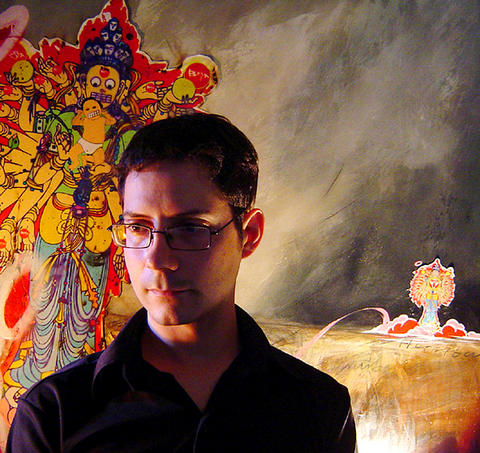With a collaborative remix electronica album available for free download, virtual weekly gigs on the Second Life Web site and a live set with hip-hop acts Kou Chou-ching (拷秋勤) , Chang Jui-Chuan (張睿銓) and Andre van Rensburg tomorrow, the Vinyl Word caught up with Taichung-based Moshang via e-mail to get the scoop on a very busy man.
Using traditional Chinese wind and string instruments such as the erhu (二胡), dizi (笛子, Chinese transverse flute), and pipa (琵琶), Moshang, 35, arranges his own street-sound recordings - which can be anything from conversations to processions - with music he records at home and other musicians' songs to produce his own special sound, which he calls "Chinese Chill."
"Turning found sounds, samples and loops into musical elements often requires painstaking editing ... similar to a jeweler cutting and polishing rough gemstones to fit a piece of jewelry," says Moshang.

PHOTO: COURTESY OF MOSHANG
Occasionally Moshang will create his own musical diamond. "By randomly connecting dots from ancient to present," he said. "I can sometimes cause a spark to fly between them and for the briefest transcendental moment the beats and notes align exactly right for something magical to be revealed."
Moshang's training began in South Africa as a choir boy. After that, he took up the saxophone and then finally broke into producing with an old Commodore Vic 20 computer. "Creating music is my greatest pleasure," he says, "so you'll mostly find me in my PC-based home-studio banging away at tunes ... working in a bit of a gray-area between downtempo electronica, jazz and world music."
Moshang's latest creation is Asian Variations. A remix "Chinese Chill" album featuring artists from all over the world such as Fort Minor, Viba, Chang, Kou and Van Rensburgthe. "I stripped away the drum tracks and replaced them with loops from my collection," Moshang said. "I also replaced most existing bass parts with ones I made myself."
Most of the artists on the album are unsigned. The Internet, although perceived by many as a great tool for putting out new music to a mass audience, also means that "with so many free singles, by so many artists, it is not necessarily easier to get heard," Moshang said. "Releasing an album makes it stand out from the crowd and provide a larger target for lightning to strike."
Moshang anticipates that playing with Kou and Chang tomorrow will be a real pleasure. They "are pretty unique in that they are rapping about socially relevant issues. Their style reminds me of some really old stuff ... like A Tribe Called Quest. Jui-Chuan is a true original. The only genuine scholar-rapper I know of [doing] hard-hitting, edgy hip-hop on Taiwanese and world political issues in Mandarin."
Moshang will make a presentation on his remixes and collaborations in Taipei on Jan. 19th at the Creative Commons workshop (see meeting.creativecommons.org.tw for more details) and will be playing at the Riverside Cafe (河岸留言) located at B1, 2, Ln 244, Roosevelt Rd, Sec 3, Taipei City (台北市羅斯福路三段244巷2號B1) in the evening. For more information, see www.riverside.com.tw
To download Asian Variations or request a free CD, visit www.asianvariations.com and to find out more about Moshang's other work visit moshang.net.

That US assistance was a model for Taiwan’s spectacular development success was early recognized by policymakers and analysts. In a report to the US Congress for the fiscal year 1962, former President John F. Kennedy noted Taiwan’s “rapid economic growth,” was “producing a substantial net gain in living.” Kennedy had a stake in Taiwan’s achievements and the US’ official development assistance (ODA) in general: In September 1961, his entreaty to make the 1960s a “decade of development,” and an accompanying proposal for dedicated legislation to this end, had been formalized by congressional passage of the Foreign Assistance Act. Two

Despite the intense sunshine, we were hardly breaking a sweat as we cruised along the flat, dedicated bike lane, well protected from the heat by a canopy of trees. The electric assist on the bikes likely made a difference, too. Far removed from the bustle and noise of the Taichung traffic, we admired the serene rural scenery, making our way over rivers, alongside rice paddies and through pear orchards. Our route for the day covered two bike paths that connect in Fengyuan District (豐原) and are best done together. The Hou-Feng Bike Path (后豐鐵馬道) runs southward from Houli District (后里) while the

March 31 to April 6 On May 13, 1950, National Taiwan University Hospital otolaryngologist Su You-peng (蘇友鵬) was summoned to the director’s office. He thought someone had complained about him practicing the violin at night, but when he entered the room, he knew something was terribly wrong. He saw several burly men who appeared to be government secret agents, and three other resident doctors: internist Hsu Chiang (許強), dermatologist Hu Pao-chen (胡寶珍) and ophthalmologist Hu Hsin-lin (胡鑫麟). They were handcuffed, herded onto two jeeps and taken to the Secrecy Bureau (保密局) for questioning. Su was still in his doctor’s robes at

Mirror mirror on the wall, what’s the fairest Disney live-action remake of them all? Wait, mirror. Hold on a second. Maybe choosing from the likes of Alice in Wonderland (2010), Mulan (2020) and The Lion King (2019) isn’t such a good idea. Mirror, on second thought, what’s on Netflix? Even the most devoted fans would have to acknowledge that these have not been the most illustrious illustrations of Disney magic. At their best (Pete’s Dragon? Cinderella?) they breathe life into old classics that could use a little updating. At their worst, well, blue Will Smith. Given the rapacious rate of remakes in modern